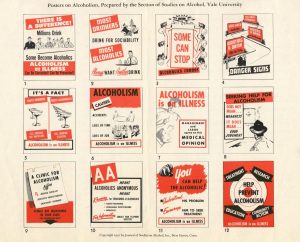The Alcohol Library collected and preserved content related to alcohol research since 1939, when the first major grant from the Carnegie Corporation was awarded to document, index, and abstract the scientific literature on the effects of alcohol on the individual. In fact, the collection and the Library evolved from that pioneering project led by E. M. Jellinek, with materials later preserved in the McCarthy Memorial Collection (print and microfiche), the Alcohol Studies Database (card catalog and online metadata), the Alcohol History Collection and Database (print only, offline database), and the Archives and Manuscript Collection (print).
 The project aims to create the Digital Alcohol Studies Archives on Rutgers University Libraries platforms from the digital artifacts and remnants of the defunct Alcohol Studies Library and Archives, such as photographs, lay and scholarly publications, pamphlets, and newsletters, to which the Center owns the copyright. They all chronicle the birth of alcohol science as it evolved at Yale and Rutgers, and they are currently not available in any public form. As the last one with personal and institutional memory of these unique resources, I have evaluated the feasibility of this project by assessing the condition of items, platform choices, tasks, and dependencies. Based on the prototypes I created, I am developing collections in RUcore and Omeka along with a portal in Drupal as front end.
The project aims to create the Digital Alcohol Studies Archives on Rutgers University Libraries platforms from the digital artifacts and remnants of the defunct Alcohol Studies Library and Archives, such as photographs, lay and scholarly publications, pamphlets, and newsletters, to which the Center owns the copyright. They all chronicle the birth of alcohol science as it evolved at Yale and Rutgers, and they are currently not available in any public form. As the last one with personal and institutional memory of these unique resources, I have evaluated the feasibility of this project by assessing the condition of items, platform choices, tasks, and dependencies. Based on the prototypes I created, I am developing collections in RUcore and Omeka along with a portal in Drupal as front end.
Goals of the Project
PRESERVATION
The project aims to preserve a crucial phase in the history of science: the birth and evolution of modern-day alcohol studies as the Section on Alcohol Studies evolved into the Center of Alcohol Studies from the initial period at Yale (1943-1961) through the successive decades at Rutgers since 1962. Preserving materials already digitized at CAS by previous librarians and my former staff, the Digital Alcohol Studies Archives will function as the repository for resources on early alcohol history as well as on the role Rutgers has played in the evolution of the field.
ACCESS
The overarching focus of the project is to provide access to materials currently unavailable for the public and raise awareness to this availability through multiple access points. Technical resources include the Omeka digital collections platform focusing on images and benefiting from its exhibit function. The RUcore Digital platform is used for complex resources in order to support in-document searching. To increase visibility and discoverability, new Drupal pages will be added to the RUL Alcohol Studies Database page, which will serve as the front end of the Digital Alcohol Studies Archives.
MODEL
With an increased focus on online resources during the pandemic, workflows and methods piloted, developed, and refined during this project explore opportunities provided by currently available platforms at RUL and may inspire librarians to showcase other hidden collections. So far, this project has been a great example of successful collaborations within RUL units and externally, with CAS, in an online work environment. Exploring options, developing and testing workflows, and refining processes will be documented for the benefit of the RUL community.
REFLECTION
The outcome, the open access digital collection, will foster reflections on past experiences by providing context for current trends and helping translate past practices to current issues in addiction research, education, and treatment. My own interest in this specific project stems from dual experiences. As a researcher, I have a special appreciation for the past. I believe we should learn from past mistakes and successes by understanding and translating past events, occurrences, and practices to our times carefully and reflectively. As the subject specialist for alcohol studies since 2007, I not only empathize with efforts to overcome addictions and to improve treatment and policy, but I believe I can also actively practice compassion and take action by providing historical context to better understand where the field of addiction studies has come from and where it might go from here.
Why Now?
The pandemic encouraged, or better to say, forced us to reassess our lives and values, and then regroup to survive safe and sane. For me these reflections, including countless hours of talking with Nick and exchanging numerous emails with trusted friends,confirmed that it’s not necessarily the LibGuides, instruction sessions or reference questions I answered will set me apart, even though I understand that many of those can make a difference in someone’s life. My legacy, hopefully, will be the Digital Alcohol Studies Archives.
